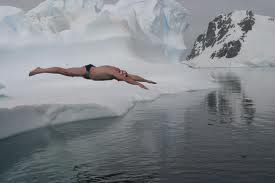The Amphibiotic Ablutionists August 22, 2013
Author: Beach Combing | in : Modern , trackback*** Sorry late, Beach family reunited today***
Diving in the freezing water is now a fairly common guarantee of guts and eccentricity. But in early nineteenth-century England it was the height of weirdness. Beach stumbled on these healthy souls while searching for more information about hydropathy. Beach is going to put up a five dollar bet that these were the first group from anywhere in the English-speaking world. Anyone care to take up that bet? drbeachcombing AT yahoo DOT com (First come first served for the purposes of money.)
There are only four members or brethren; the oldest and the founder of the society is Mr. John Higgins, who 48 years ago, was sorely afflicted with ‘twitching of the nerves’, and after vainly testing many remedies, was at last recommended by Dr. S. A. Bardsley to try what cold bathing would do.
‘Twitching of the nerves’, a psychological problem, Parkinsons, some form of defficiency, too much caffeine (or withdrawal of the same)?
He tried the (Bridgewater) canal adjacent to Hulme Hall, but it did him little good. Still he persevered, and at last found that the disease had left him. Shortly afterwards a Stretfordian recommended the Cheshire waters (i.e. the Mersey) at Barlow Platt Hole. At that time the Bridgewater Canal was comparatively clean, and the Mersey was also much cleaner than at present. It was in the recollection of a person lately deceased that salmon came up the river to Stretford.
Beach loves the idea that one body of water works and yet another doesn’t!
But to return to Mr Higgins. From 1812 up to the present time (June 1860) he has continued the practice of bathing, at least once a week, and with the most beneficial results to his bodily health. He has scarcely ever had a day’s illness throughout that long period; and never has the weather no matter how inclement, deterred him from extra-mural immersion.
It now transpires that an important part of the ritual dive is the pre and post walk: there is also the question of fellowship of like-minded men.
Before me lies a catalogue of some of the extraordinary feats of pedestrianism performed before breakfast and without either ‘biting or supping’ on the way. The distances given include, of course, the return journeys to Manchester. Once every week to bathe in the Mersey at Stretford, upwards of eight miles; many times to Bollin, 20 miles; to Knutsford, 30; Alderley Edge, 30; Peover, 36; Warrington, 37; and Northwich 40 miles. The veteran has accomplished these rambles at a speed of about four miles an hour, with very little personal fatigue. As we can testify, Mr Higgins is still hale and vigorous, and likely to enjoy his cold plunges for many years to come. About 30 years ago Mr Steel was admitted as the second member of the societ; Mr Richard joined in 1843; and, lastly, Mr Owen was initiated upwards of three years ago.
There follows a description of them diving into the freezing water.
Emerging from the water, first the bathers run about the meadown, and then deliberately plonk themselves down and pull on their hosen, whilst their shirts remain snug and dry under and umbrella. The rain pours down delightfully for a spring morning, and the hollows of their backs act as gutters for the wet. A pleasant walk in the rain, and then, after eight or nine miles tramping without either ‘bite or sup,’ in accordance with the rule, it is needless to add that a sharpened appetite eagerly disposed of a right good breakfast.



